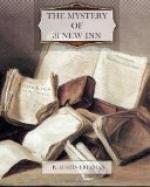“At any rate,” said I, “it was taking a considerable risk. I might have left the theatre before she came back.”
“Yes,” Thorndyke agreed. “But it is like a woman to take chances. A man would probably have stuck to you when once he had got you off your guard. But she was ready to take chances. She chanced the railway, and it came off; she chanced your remaining in the theatre, and that came off too. She calculated on the probability of your getting tea when you came out, and she hit it off again. And then she took one chance too many; she assumed that you probably took sugar in your tea, and she was wrong.”
“We are taking it for granted that the sugar was prepared,” I remarked.
“Yes. Our explanation is entirely hypothetical and may be entirely wrong. But it all hangs together, and if we find any poisonous matter in the sugar, it will be reasonable to assume that we are right. The sugar is the Experimentum Crucis. If you will hand it over to me, we will go up to the laboratory and make a preliminary test or two.”
I took the lump of sugar from my pocket and gave it to him, and he carried it to the gas-burner, by the light of which he examined it with a lens.
“I don’t see any foreign crystals on the surface,” said he; “but we had better make a solution and go to work systematically. If it contains any poison we may assume that it will be some alkaloid, though I will test for arsenic too. But a man of Weiss’s type would almost certainly use an alkaloid, on account of its smaller bulk and more ready solubility. You ought not to have carried this loose in your pocket. For legal purposes that would seriously interfere with its value as evidence. Bodies that are suspected of containing poison should be carefully isolated and preserved from contact with anything that might lead to doubt in the analysis. It doesn’t matter much to us, as this analysis is only for our own information and we can satisfy ourselves as to the state of your pocket. But bear the rule in mind another time.”
We now ascended to the laboratory, where Thorndyke proceeded at once to dissolve the lump of sugar in a measured quantity of distilled water by the aid of gentle heat.
“Before we add any acid,” said he, “or introduce any fresh matter, we will adopt the simple preliminary measure of tasting the solution. The sugar is a disturbing factor, but some of the alkaloids and most mineral poisons excepting arsenic have a very characteristic taste.”
He dipped a glass rod in the warm solution and applied it gingerly to his tongue.
“Ha!” he exclaimed, as he carefully wiped his mouth with his handkerchief, “simple methods are often very valuable. There isn’t much doubt as to what is in that sugar. Let me recommend my learned brother to try the flavour. But be careful. A little of this will go a long way.”
He took a fresh rod from the rack, and, dipping it in the solution, handed it to me. I cautiously applied it to the tip of my tongue and was immediately aware of a peculiar tingling sensation accompanied by a feeling of numbness.




